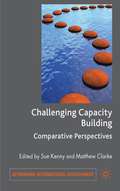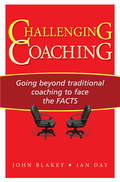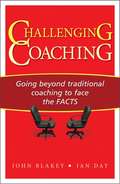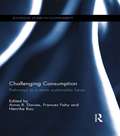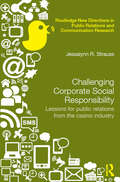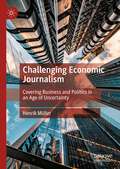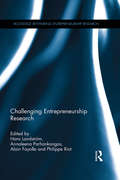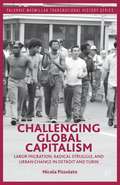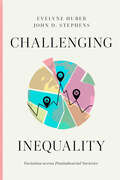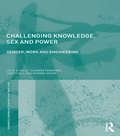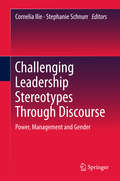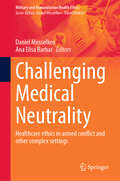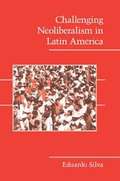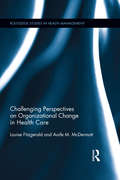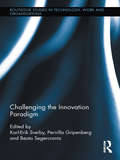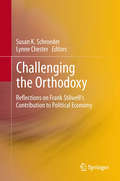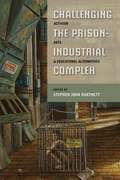- Table View
- List View
Challenges to the Swedish Welfare State (EPub)
by Desmond Lachman Robert P. Hagemann Adam Bennett J. H. Green Ramana RamaswamySweden's economy in the early 1990s has been characterized by a deep recession, high unemployment, a ballooning public sector budgete deficit, and a decline in the value of the currency- developments that have raised questions about the country's capacity to sustain its comprehensive welfare state. This study provides an analysis of recent economic developments in a longer-term context and assesses their implications for future policies.
Challenging Boardroom Homogeneity
by Aaron A. DhirThe lack of gender parity in the governance of business corporations has ignited a heated global debate, leading policymakers to wrestle with difficult questions that lie at the intersection of market activity and social identity politics. Drawing on semi-structured interviews with corporate board directors in Norway and documentary content analysis of corporate securities filings in the United States, Challenging Boardroom Homogeneity empirically investigates two distinct regulatory models designed to address diversity in the boardroom: quotas and disclosure. The author's study of the Norwegian quota model demonstrates the important role diversity can play in enhancing the quality of corporate governance, while also revealing the challenges diversity mandates pose. His analysis of the US regime shows how a disclosure model has led corporations to establish a vocabulary of 'diversity'. At the same time, the analysis highlights the downsides of affording firms too much discretion in defining that concept. This book deepens ongoing policy conversations and offers new insights into the role law can play in reshaping the gendered dynamics of corporate governance cultures.
Challenging Capacity Building
by Matthew Clarke Sue KennyThe focus of most capacity building programs is poor and disadvantaged communities. However, the appropriateness of capacity building for these groups, whether located in 'developing' or 'developed' countries, is always presented as self-evident. In much of the discussion of 'how to' build capacity, critical questions regarding the determination of whose capacities are to be built, the methods by which capacity will be built and the consequences for wider relationships of those whose capacity is being built (and presumably for those whose capacity is being left to be built at another time!) are not investigated. A deeper understanding of the meaning, practice and potential of capacity building is required. This book challenges capacity building by critically interrogating its central ideas and practices. But it also considers the ways in which capacity building itself can challenge disadvantage and inequality, by offering a self-determining way forward for communities.
Challenging Coaching
by Ian Day John BlakeyBased on the authors' extensive experience working with international Board level teams, Challenging Coaching suggests that for too long coaches have shied away from adopting a more challenging stance in their work - a stance that can provoke greater performance and unlock deeper potential in business leaders and their teams. In particular, the authors offer a new coaching approach, FACTS, to help coaches develop this challenging stance. The FACTS approach with its emphasis on FeeDavies-Blackack, Accountability, Courageous Goals, Tension and Systems Thinking is explored in theory and in practice using case studies, example dialogues and practical exercises. Long held coaching principles such as being non-directive, building rapport and holding to the client's agenda are put under the spotlight with the authors questioning their relevance to a 21st century business environment where the needs of the wider business must take precedence over the "me me me" of any specific executive. This is a timely wake up call for anyone who is responsible for the performance of others - be they coach, business leader or leadership development expert. An original and thought-provoking message that dares the reader to face the FACTS, and accept the coaching challenge.
Challenging Coaching: Going Beyond Traditional Coaching to Face the FACTS
by Ian Day John BlakeyChallenging Coaching is a real-world, timely and provocative book which provides a wake-up call to move beyond the limitations of traditional coaching. Based on the authors' extensive experience working at board and management levels, they suggest that for far too long coaching approaches have shied away from adopting a more challenging stance - a stance that can provoke greater performance and unlock deeper potential in business leaders and their teams. The authors detail their unique FACTS coaching model, which provides a practical and pragmatic approach focusing on Feedback, Accountability, Courageous goals, Tension and Systems thinking. The authors explore FACTS coaching in theory and in practice using case studies, example dialogues and practical exercises so that the reader will be able to successfully challenge others using respectful yet direct techniques. This is an original and thought-provoking book that dares the reader to go beyond traditional coaching and face the FACTS.
Challenging Coaching: Going Beyond Traditional Coaching to Face the FACTS
by Ian Day John BlakeyChallenging Coaching is a real-world, timely and provocative book which provides a wake-up call to move beyond the limitations of traditional coaching. Based on the authors' extensive experience working at board and management levels, they suggest that for far too long coaching approaches have shied away from adopting a more challenging stance - a stance that can provoke greater performance and unlock deeper potential in business leaders and their teams. The authors detail their unique FACTS coaching model, which provides a practical and pragmatic approach focusing on Feedback, Accountability, Courageous goals, Tension and Systems thinking. The authors explore FACTS coaching in theory and in practice using case studies, example dialogues and practical exercises so that the reader will be able to successfully challenge others using respectful yet direct techniques. This is an original and thought-provoking book that dares the reader to go beyond traditional coaching and face the FACTS.
Challenging Colonial Administrative Behavior in Bangladesh
by Hasanuzzaman ZamanThis book studies public policy and administration in Bangladesh. It studies how, despite recording high-levels of corruption persistently, some governments in least developed countries (LDCs) like Bangladesh have achieved impressive online transformation level, through digital, electronic or e-Government implementation. The book investigates the historical and political context, and examines the different policies and strategies adopted by successive governments of Bangladesh for facilitating digital service delivery transformation of traditional, paper-based, circuitous public service delivery processes. It reviews public administration reforms introduced over several decades, and other initiatives launched with the specific objective of improving service delivery management. The volume also contextualizes the new e-Government development initiatives in light of the various approaches such as traditional public administration, new public management, digital era governance, new public governance, and design thinking. Drawing on a host of published and unpublished materials, interviews with senior public officials, academics, representatives of international donor agencies, think tanks and non-governmental organizations, and a survey of more than 400 plus bureaucrats, the book analyzes the progress of digital government in Bangladesh from a soft, behavioral perspective. It will be of great interest to scholars and researchers of public policy and public administration, politics, innovation, and South Asian studies. It will be an essential reading for bureaucrats and government officials, as well as think tanks and NGOs.
Challenging Consumption: Pathways to a more Sustainable Future (Routledge Studies in Sustainability)
by Frances Fahy Henrike Rau Anna R. DaviesSustainable consumption is a central research topic in academic discourses of sustainable development and global environmental change. Informed by a number of disciplinary perspectives, this book is structured around four key themes in sustainable consumption research: Living, Moving, Dwelling and Futures. The collection successfully balances theoretical insights with grounded case studies, on mobility, heating, washing and eating practices, and concludes by exploring future sustainable consumption research pathways and policy recommendations. Theoretical frameworks are advanced throughout the volume, especially in relation to social practice theory, theories of behavioural change and innovative visioning and backcasting methodologies. This groundbreaking book draws on some conceptual approaches which move beyond the responsibility of the individual consumer to take into account wider social, economic and political structures and processes in order to highlight both possibilities for and challenges to sustainable consumption. This approach enables students and policy-makers alike to easily recognise the applicability of social science theories.
Challenging Corporate Social Responsibility: Lessons for public relations from the casino industry (Routledge New Directions in PR & Communication Research)
by Jessalynn R. StraussThe concept of Corporate Social Responsibility (CSR) has become increasingly widespread, as businesses seek to incorporate socially responsible behaviors while still being accountable to shareholders. Indeed some research has suggested that CSR in itself can form the basis of good PR by promoting consumers’ purchase decisions. Arguing that this approach is a dangerous oversimplification, this book takes a deeper look at the concept of CSR in a particularly challenging context - casino gaming. Originally the province of seedy, backdoor establishments in isolated cities, casino gaming has become a multibillion-dollar global industry. Drawing on in-depth research in Las Vegas, this unique study examines how and why corporations in the casino industry interpret and engage in CSR through community support, environmental issues, labor rights, and corporate governance. Through in-depth analysis of CSR in this industry, this book adds a new dimension to the debate on the role of CSR and public relations in business. Given the burgeoning relationship between CSR and corporate PR, the book seeks to illuminate CSR’s complexities, contradictions, and moral obligations. It will be of interest to all scholars of public relations, corporate communications, and corporate reputation.
Challenging Economic Journalism: Covering Business and Politics in an Age of Uncertainty
by Henrik MüllerThis book, inspired partly by journalism's failure to raise early warning flags in the run up to financial crises and by the rise of (economic) populism in recent years, puts forward a framework for economic journalism. It argues that that independent quality economic journalism is essential to the functioning of both the market and democracy but is under threat, and explores questions raised by the decline of media trust: what is the value of economic journalism? And how can journalists change their practices to counter this decline? The book takes a global approach with one chapter focusing on European integration and concludes with an outlook on the future of economic journalism, and the financing of journalism more widely.
Challenging Entrepreneurship Research (Routledge Rethinking Entrepreneurship Research)
by Alain Fayolle Hans Landstrom Annaleena Parhankangas Philippe RiotThe growth of entrepreneurship research has been accompanied by an increased convergence and institutionalization of the field. In many ways this is of course positive, but it also represents how the field has become "mainstream" with the concomitant risk that individual scholars become embedded in a culture and incentive system that emphasizes and rewards incremental research questions, while reducing the incentives for scholars to conduct challenging research. This book challenges this status quo from accepted theories, methodologies and paradigmatic assumptions, to the relevance (or lack of) for contemporary practice and the impact of key journals on scholars’ directions in entrepreneurship research. An invited selection of the younger generation of scholars within the field of entrepreneurship research adopt a critical and constructive posture on what has been achieved in entrepreneurship research, the main assumptions which underly it, but also open-up new paths for creative entrepreneurship research in the future. This is a must-read for all scholars, educators and advanced students in entrepreneurship research.
Challenging Global Capitalism
by Nicola PizzolatoIn the 1950s, 1960s, and 1970s, Detroit and Turin were both sites of significant political and social upheaval. This comparative and transnational study examines the political and theoretical developments that emerged in these two "motor cities" among activist workers and political militants during these decades.
Challenging Global Finance
by Elizabeth FriesenFriesen demonstrates how transnational CSOs and NGOs can influence the context in which international political decisions are made. She shows how, by reframing the issues, the transnational campaign for the cancellation of third world debt altered the dominant discourse, shifted the agenda and thereby shaped political outcomes.
Challenging Inequality: Variation across Postindustrial Societies
by Evelyne Huber John D. StephensA wide-ranging examination of how policies, parties, and labor strength affect inequality in post-industrial societies. Not all countries are unequal in the same ways or to the same degree. In Challenging Inequality, Evelyne Huber and John D. Stephens analyze different patterns of increasing income inequality in post-industrial societies since the 1980s, assessing the policies and social structures best able to mitigate against the worst effects of market inequality. Combining statistical data analysis from twenty-two countries with a comparative historical analysis of Germany, Spain, Sweden, and the United States, Huber and Stephens identify the factors that drive increases in inequality and shape persistent, marked differences between countries. Their statistical analysis confirms generalizable patterns and in-depth country studies help to further elucidate the processes at work. Challenging Inequality shows how the combination of globalization and skill-biased technological change has led to both labor market dualization and rising unemployment levels, which in turn have had important effects on inequality and poverty. Labor strength—at both the society level and the enterprise level—has helped to counter rising market income inequality, as has a history of strong human capital spending. The generosity of the welfare state remains the most important factor shaping redistribution, while the consistent power of left parties is the common denominator behind both welfare state generosity and human capital investment.
Challenging Knowledge, Sex and Power: Gender, Work and Engineering (Routledge IAFFE Advances in Feminist Economics)
by Judith Gill Suzanne Franzway Julie E. Mills Rhonda SharpWomen in the developed world expect to work in the labour force over the course of their lives. On finishing school more girls are entering universities and undertaking professional training for careers than ever before. Males and females enter many high status professions in roughly equal numbers. However, engineering stands out as a profession that remains obstinately male dominated. Despite efforts to change, little progress has been made in attracting and retaining women in engineering. This book analyses the outcomes of a decade-long investigation into this phenomenon, framed by two questions: Why are there so few women in engineering? And why is this so difficult to change? The study includes data from two major surveys, accounts from female engineers in a range of locations and engineering fields, and case studies of three large engineering corporations. The authors explore the history and politics of several organisations related to women in engineering, and conclude with an analysis of a range of campaigns that have been waged to address the issue of women’s minority status in engineering. Challenging Knowledge, Sex and Power will be of great interest to students of feminist economics, and is also relevant to researchers in women’s studies and engineering education.
Challenging Leadership Stereotypes through Discourse: Power, Management and Gender
by Cornelia Ilie Stephanie SchnurrThis multidisciplinary volume brings together wide-ranging empirical research that goes behind the scenes of diverse organizations dealing with business, politics, law, media, education, and sports to unravel stereotypes of discursive leadership practices as they unfold in situ. It includes contributions that explore how leadership discourse is impacted by increasing pressures of "glocalization" (the need to communicate across cultures and languages), "mediatization" (leaving ubiquitous digital traces), standardization (with quality management programmes negotiating organizational procedures), mobility (endless fast-paced long distance synchronization) and acceleration (permanent co-adaption and change). The discussion of purposefully chosen case studies moves beyond questions of who is a leader and what leaders do, to how leadership stereotypes are being challenged in various communities of practice, and thereby making change possible. Cross-cultural and interdisciplinary approaches are used to get deeper insights into the competing, multi-voiced, controversial and complex identities and relationships enacted in leadership discourse practices.
Challenging Legitimacy at the Precipice of Energy Calamity
by Mike Gismondi Debra J. DavidsonHuman history has often been described as a progressive relinquishment from environmental constraints. Now, it seems, we have come full circle. The ecological irrationalities associated with industrial societies have a lengthy history, and our purpose in the proposed book is not to catalogue this litany of wrongs. Rather, this book is about political responses to global environmental crisis at a crucial turning point in history, by focusing on the political discourses surrounding the tar sands in Alberta, Canada.
Challenging Malaria: The Private and Social Incentives of Mosquito Control
by Byron B. Carson, IIIFive years after Ronald Ross discovered the link between malaria and mosquitos, American entomologist Leland Howard wrote of the "mosquito evil" that occurs when "everybody's business is nobody's business." Howard’s insight was largely ignored, but it captures what social scientists now refer to as the problem of collective action. When this problem persists in the context of malaria, individuals under-provide prevention and suffer from a higher prevalence of malaria. Imagine a group of people trying to drain a pond where mosquitoes breed. Everyone in the group faces an incentive to free ride, which can hinder their drainage efforts. Thus, when people fail to resolve issues related to collective action, they submit to the "mosquito evil" and, potentially, to malaria. This book explores Howard’s logic, the economics of collective action, and the history, epidemiology, and public health of malaria to analyze the conditions under which people privately resolve collective action problems associated with mosquito abatement and malaria prevention. Generally, people are more likely to resolve these problems when the benefits of abatement and prevention outweigh the costs. This logic is developed into a framework and applied to historical and modern-day issues related to malaria, including the lack or abundance of private prevention in the United States and in developing areas; malaria’s resurgence in countries like China, Venezuela, and Bangladesh; and the difficulties of large-scale insecticide-treated bed net campaigns. Given this framework, we should develop a greater appreciation for entrepreneurial responses, civil society, market processes, and private forms of collective action.
Challenging Medical Neutrality: Healthcare ethics in armed conflict and other complex settings (Military and Humanitarian Health Ethics)
by Daniel Messelken Ana Elisa BarbarIn this volume, the concept of "medical neutrality," which states that medical services should not be interfered with during armed conflicts and other emergencies, is challenged based on the experience and expertise of the authors, who come from diverse military, humanitarian, and academic backgrounds. The principle of medical neutrality is grounded in International Humanitarian Law as well as in Human Rights Law and it can be justified by ethical rationales such as the principle of Humanity and ordinary medical ethics. Health workers often understand medical neutrality as an obligation not to engage in anything else other than medical outcomes. In this book, a variety of problems and ethical issues in the application of medical neutrality in the professional practice of healthcare personnel are analyzed. The contributors expand the debate around “medical neutrality” and aim at better-informing policy and operational decisions regarding the application of medical ethics, the protection of medical missions in conflict, and the training of healthcare professionals to operate ethically and safely in volatile environments. The volume is of great interest to academics, practitioners, policymakers, and students who are looking for analyses and guidance regarding medical neutrality.
Challenging Neoliberalism in Latin America
by Eduardo SilvaAt the turn of the twentieth century, a concatenation of diverse social movements arose unexpectedly in Latin America, culminating in massive anti-free market demonstrations. These events ushered in governments in Argentina, Bolivia, Ecuador, and Venezuela that advocated socialization and planning, challenging the consensus over neoliberal hegemony and the weakness of movements to oppose it. Eduardo Silva offers the first comprehensive comparative account of these extraordinary events, arguing that the shift was influenced by favorable political associational space, a reformist orientation to demands, economic crisis, and mechanisms that facilitated horizontal linkages among a wide variety of social movement organizations. His analysis applies Karl Polanyi's theory of the double movement of market society to these events, predicting the dawning of an era more supportive of government intervention in the economy and society.
Challenging Operations: Medical Reform and Resistance in Surgery
by Katherine C. KelloggIn 2003, in the face of errors and accidents caused by medical and surgical trainees, the American Council of Graduate Medical Education mandated a reduction in resident work hours to eighty per week. Over the course of two and a half years spent observing residents and staff surgeons trying to implement this new regulation, Katherine C. Kellogg discovered that resistance to it was both strong and successful—in fact, two of the three hospitals she studied failed to make the change. Challenging Operations takes up the apparent paradox of medical professionals resisting reforms designed to help them and their patients. Through vivid anecdotes, interviews, and incisive observation and analysis, Kellogg shows the complex ways that institutional reforms spark resistance when they challenge long-standing beliefs, roles, and systems of authority. At a time when numerous policies have been enacted to address the nation’s soaring medical costs, uneven access to care, and shortage of primary-care physicians, Challenging Operations sheds new light on the difficulty of implementing reforms and offers concrete recommendations for effectively meeting that challenge.
Challenging Perspectives on Organizational Change in Health Care (Routledge Studies in Health Management)
by Louise Fitzgerald Aoife McDermottThis volume provides theory and research on organizational change and predominantly features the application of these ideas to the health care domain, broadly defined. It addresses enduring issues in advancing to an effective health care system. The aim of this book is to offer an accessible and readable text aimed at provoking thought and questioning, and aiding creativity. It proffers arguments and ideas which are firmly based in empirical data and evidence, so that the reader may make informed personal evaluations. This book is designed to furnish a comprehensive theoretical basis for understanding organizational change in health care, as well as selected core issues of contemporary and future importance to the provision of effective care within sustainable systems. A series of coherent themes are addressed throughout the book from differing perspectives. However, every chapter has been written to standalone and be read independently. Each offers resources relevant to its’ focal topic, in the form of references, case studies and critique. Setting out a future research agenda, the book will be vital reading for organizational change researchers and practitioners in the healthcare industry.
Challenging the Innovation Paradigm (Routledge Studies in Technology, Work and Organizations)
by Karl-Erik Sveiby Pernilla Gripenberg Beata SegercrantzInnovation is almost always seen as a "good thing". Challenging the Innovation Paradigm is a critical analysis of the innovation frenzy and contemporary innovation research. The one-sided focus on desirable effects of innovation misses many opportunities to reduce the undesirable consequences. Authors in this book show how systemic effects outside the innovating firms reduce the net benefits of innovation for individual employees, customers, as well as for society as a whole - also the innovators' own organizations. This book analyzes the dominant discourses that construct and reconstruct the assumptions and one-sidedness of contemporary innovation research (generally known as the pro-innovation bias) by focusing on consequences of innovation, distinguishing between intended and unintended as well as desirable and undesirable consequences. Contributors illustrate how both the discourses of innovation and the consequences of innovation permeate all levels of society: in policy discourse, in academic discourse, in research funding, in national innovation systems, in the financial sector, in organizational and work contexts, and in environmental pollution. The volume offers a critical, multidisciplinary, and multinational perspective on the topic, with authors from diverse academic fields examining and making comparisons between a variety of national contexts.
Challenging the Orthodoxy: Reflections on Frank Stilwell's Contribution to Political Economy
by Susan K. Schroeder Lynne ChesterPolitical economy focuses on issues that are fundamental to individual and collective well-being and rests on the proposition that economic phenomena do not occur in isolation from social and political processes. One leading Australian political economist is Frank Stilwell. Highlights of his work include concerns with the creation and use of wealth, inequalities between rich and poor, the spatial implications of economic growth, and the tensions between economic growth and the environment. Stilwell has been especially prominent in developing alternative economic policies, with seminal contributions to understanding the radical shift in Australian economic and social policies since the early 1980s. He has also been a leader in the teaching of political economy to many cohorts of first-year university students. This collection, spanning these themes, honours Stilwell's contribution to Australian political economy after more than 40 years teaching at the University of Sydney. The book provides not only an opportunity to appreciate his contribution but also a greater understanding of these themes which remain of crucial contemporary relevance.
Challenging the Prison-Industrial Complex
by Stephen John HartnettBoldly and eloquently contributing to the argument against the prison system in the United States, these provocative essays offer an ideological and practical framework for empowering prisoners instead of incarcerating them. Experts and activists who have worked within and against the prison system join forces here to call attention to the debilitating effects of a punishment-driven society and offer clear-eyed alternatives that emphasize working directly with prisoners and their communities. Edited by Stephen John Hartnett, the volume offers rhetorical and political analyses of police culture, the so-called drug war, media coverage of crime stories, and the public-school-to-prison pipeline. The collection also includes case studies of successful prison arts and education programs in Michigan, California, Missouri, Wisconsin, and Pennsylvania that provide creative and intellectual resources typically denied to citizens living behind bars. Writings and artwork created by prisoners in such programs richly enhance the volume. Contributors are Buzz Alexander, Rose Braz, Travis L. Dixon, Garrett Albert Duncan, Stephen John Hartnett, Julilly Kohler-Hausmann, Daniel Mark Larson, Erica R. Meiners, Janie Paul, Lori Pompa, Jonathan Shailor, Robin Sohnen, and Myesha Williams.

